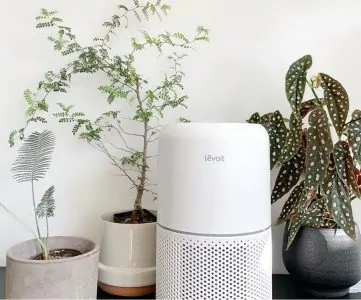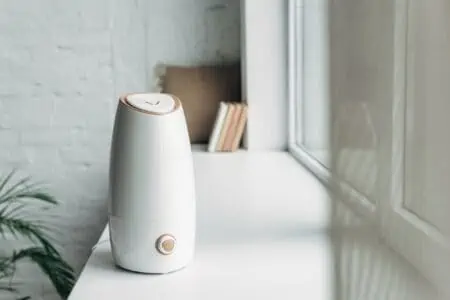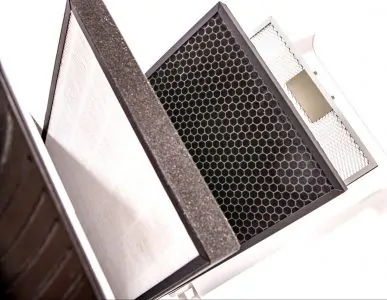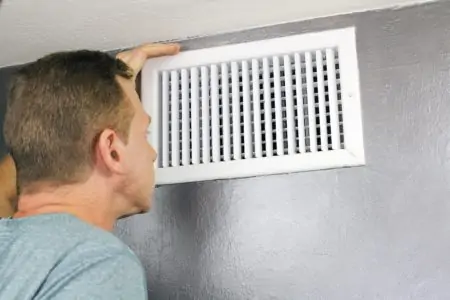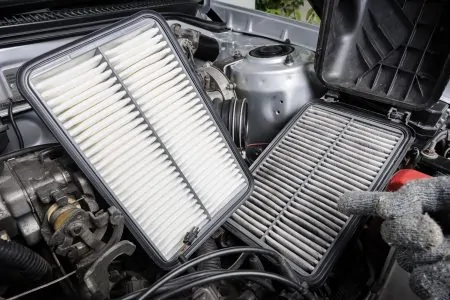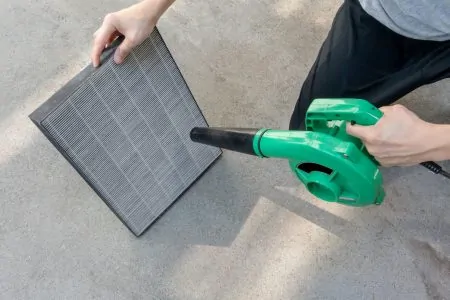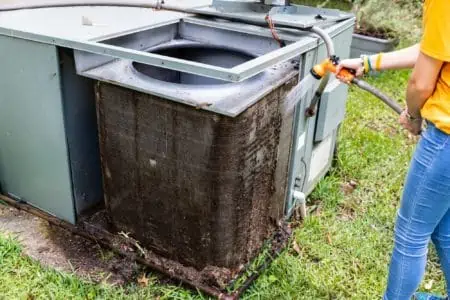Are you aware that indoor air quality can be worse than outdoors? There are many airborne pollutants within a home, including mold spores, pet dander, allergens, and VOCs. If you have a runny nose, cough, or continuous headaches worse indoors, your home might just be severely polluted.
Many homeowners look to improve their home environment for themselves and their loved ones. So, what if we told you there’s a device that cleans the air that you and your family breathe?
Air purifiers have grown in popularity in recent times. These devices promise to improve your home environment, but do they work? Let’s find out.
Key Takeaways
- Air purifiers work by filtering pollutants like allergens, dust, spores, pollen, and more from the air, improving indoor air quality.
- True HEPA filters are the most effective, capturing up to 99.97% of airborne pollutants at the size of 0.3 microns.
- Air purifiers can help alleviate allergy and asthma symptoms but can’t remove allergens embedded in furniture or flooring.
- Regular filter replacement and maintenance are essential for optimal air purifier performance.
Do Air Purifiers Really Work?
Yes! But it’s important to understand what they can and can’t do.
Air purifiers are designed to strip the air of pollutants. This includes allergens, dust, spores, pollen, and more (1). Some purifiers will also capture or reduce bacteria, viruses, and odors. However, not all units will be able to do this.
Additionally, it’s crucial to understand that not all units can catch volatile organic compounds. These are commonly found in aerosol sprays and common household cleaners (2).
If you’re struggling with allergies or asthma, an air purifier will be beneficial as it removes common allergens. However, it will only remove airborne allergens; it won’t be able to remove allergens embedded in furniture or flooring.
For your air purifier to work efficiently, it’s crucial to replace the filters often. Most manufacturers will provide you with useful guidance. However, the exact time depends on a few factors, such as usage and air quality.
It’s also important to be realistic when using an air purifier. Many companies will claim their products to have an efficiency of 99 percent. However, air purifiers are tested in controlled rooms, so the effectiveness can vary.
Where you locate the unit also plays a significant role in how effective it will be. You must read the directions when installing your new air purifier to ensure it’s placed in the correct spot. Some units require a certain space between them and the wall, while smaller units can usually be installed on a table or desk.
How Do Air Purifiers Work?
Air purifiers work by drawing air into the unit via a fan powered by a motor. The air is then passed through a series of filters. The number of filters depends on the unit. Some air purifiers have a five-stage filtration system, while others use two or three.
However, as we mentioned above, there are various types of air purifiers, and they all work differently. Let’s take a closer look:
Filtered
One of the most effective and popular air purifiers is the filtered type. These are fitted with one or more filters that capture and remove pollutants as they pass through. How effective this depends on the filter and its quality.
Most filtered air purifiers are fitted with a true HEPA filter. These are meant to capture up to 99.97 percent of airborne pollutants at the size of 0.3 microns (3).
However, not all filters marked as HEPA are genuine. HEPA-type, HEPA-grade, or HEPA-like filters are constructed similarly to true HEPAs. But these types will only capture 99 percent or less of pollutants.
Filtered air purifiers are usually fitted with a pre-filter and an activated carbon filter. The pre-filter is designed to capture larger particles such as pet hair and large dust particles.
The activated carbon filter is also an essential part of an effective air purifier. You see, the HEPA filter won’t capture everything. Things like gases, odors, and VOCs will generally slip past the grip of the HEPA fibers.
However, the activated carbon filter will absorb unpleasant odors, gases, fumes, and VOCs. If your air purifier has an activated carbon filter, you must replace it regularly, usually around every two to three months. These filters can only hold so much before they become less effective or not effective at all (4).
Ionizer
Air ionizers are the next most popular air purifiers on the market. Unlike the filtered version, these do not draw air in to pass it through a filter.
Ionizers emit electrically charged ions into the room where they’re installed. The negative ions will bind to particles in the air (dust, pollen, allergens). These will then weigh them down, eventually dropping to the ground.
Some ionizers are fitted with a “collecting plate,” which is an oppositely-charged metal plate that attracts the electrically charged particles. The particles are then collected on the plate that you can wipe clean when needed.
On the other hand, some ionizers do not use a collecting plate. These are less effective since the particles will drop to the nearest surface, such as the wall, couch, carpet, or bed. You’ll then have to spend additional time cleaning to eliminate the unwanted pollutants.
One of the more damaging effects of ionizers is their byproduct: ozone. Ozone is a lung irritant and can trigger asthma attacks in sensitive individuals. Exposure to ozone can also trigger other effects such as nausea, headaches, coughing, and fatigue (5). For this reason alone, we tend not to recommend ionizers.
Ionizers are commonly sold as standalone units. Alternatively, you can find filtered air purifiers with an ionizing feature.
Take Note
Are Air Purifiers Worth It?
As we saw above, air purifiers really do work and can definitely make a difference. However, whether or not you need an air purifier depends on a few factors. Air purifiers aren’t cheap; the initial price can range from around $50 to over $1,000.
There are also maintenance costs to be accounted for as well. Filters must be changed regularly, which can be expensive, depending on the brand.
You can find filtered air purifiers with washable filters. These are easily cleaned, dried, and put back into the unit. Ionizers, too, are easy to maintain as they don’t have any filters.
To know whether or not air purifiers are worth it, let’s see some advantages and disadvantages.
Advantages
Good for Families
Creating a safe home environment for your children to thrive in is a priority for many parents.
Children are more sensitive to allergens and contaminants in the air compared to healthy adults. So if you have a newborn in the house, keeping the air clean becomes even more important.
Placing a small air purifier next to the crib will help to clean the air your baby breathes. This, in turn, lowers the risk of your child developing asthma or allergy symptoms.
Good for Pet Families
We love our pets like we love our children — they have a special spot in our hearts and home. But unfortunately, their presence is very much noticed. Shed fur, odors, and dander are common allergy and asthma triggers.
If you’re struggling with these aspects of being a pet owner, you could benefit from an air purifier. A true HEPA filter will capture dander, and an activated carbon filter will absorb unpleasant odors.
Removes Odors
Most filtered units are fitted with an activated carbon filter that absorbs odors and creates a more neutral space.
Traps Allergens
Did you know that 30 percent of adults and 40 percent of children in the US are affected by allergies? If anyone in your household is dealing with allergies or asthma, an air purifier will be very beneficial (7).
A true HEPA filter is highly effective at trapping allergens such as dust mites, pet dander, and pollen. It will capture particles at the tiny size of 0.3 microns. To give you an idea of just how small this is, we’re unable to see anything smaller than 10 microns (8).
Neutralizes Smoke
Smoke is not something you want in your house. And if you have children in the house, keeping smoke at bay becomes even more important. Air purifiers will effectively remove smoke caused by cooking and tobacco. That way, you and your family can enjoy a healthy atmosphere.
Disadvantages
Maintenance
For your purifier to work at an optimal level, you need to care for it. Regular maintenance is a must. If your unit uses replaceable filters, these need to be changed regularly.
Not only can this be inconvenient if your days are busy, but it can also be expensive (as we explained above). On the other hand, if you have an ionizer, you’ll need to deep clean more often to remove all of the fallen particles.
Performance
The manufacturer might claim an efficiency rate of 99 percent, but you shouldn’t expect this. Typically, these companies test their products in controlled conditions.
Tests are also usually done on the highest setting. In reality, you’re more likely to use lower settings due to noise.
Also, allergens such as dust mites often reside within mattresses, couches, and carpets. Sadly, air purifiers can’t reach these embedded particles.
Noise Levels
As we briefly mentioned, noise levels are an issue for many homeowners. Some air purifiers can be annoyingly loud on any setting other than low. Many compare the sound to a large fan blowing continuously, while others compare it to a loud buzzing.
Will an Air Purifier Benefit Me?
Whether or not you will benefit from an air purifier is a personal decision. It’s essential to consider your home environment and the health conditions of the people living in your house. Ask yourself the following before buying an air purifier:
- Do you or anyone in your house have allergies or asthma?
- Do you live in a big city or close to a busy road?
- Are you or someone in your house prone to infections?
If you answered yes to the above points, an air purifier is a good fit.
If the above points don’t apply to you, an air purifier might not be beneficial. It could be an expensive, unnecessary purchase if it is not needed.
There are many ways to improve indoor air quality without raising energy bills (9). Try the following:
- Clean regularly
- Air out during and after cleaning
- Use a vacuum with a HEPA filter
- Smoke only outside
- Frequently groom pets to reduce shed hair
Air Purifier Myths
Air purifiers can be highly beneficial if truly needed. However, there are many myths about these devices. These cause a lot of misconceptions and false expectations for people new to air purifiers.
You Won’t Need to Clean as Often
This is one of the biggest myths about air purifiers. Many new buyers think that air purifiers will reduce the need to clean as often. However, this is not entirely true.
Air purifiers will remove dust and other particles from the air but will not remove dust or dirt from surfaces. Maintaining your regular cleaning regime to assist the purifier and create a healthy home environment is important.
An Air Purifier Will Fix Your Allergy Blues
Air purifiers are well-known for improving your home environment by eliminating allergens. However, you shouldn’t expect your air purifier to be the perfect solution. This is a common mistake made by manufacturers who specifically market their purifiers as the answer to allergies.
You must continue cleaning regularly, wash your bedding, and vacuum carpets to eliminate allergens. Additionally, consider running a dehumidifier to reduce mold or mildew growing (10).
If the Purifier Uses a HEPA Filter, It Must Be Good
HEPA filters are high-efficiency filters, but not all HEPAs are alike. As we discussed above, there are many different types. What you should look for is the one marked as true HEPA.
It’s also important to note that bacteria and mold can accumulate on the fibers within the filter. Spores and bacteria can then be released back into the air, re-contaminating your room. To avoid this, you must replace filters when needed.
Some units are also poorly constructed. For the filter to work effectively, it must be in an airtight case. If the case isn’t airtight, the contaminated air can escape around the filter, reentering the room.
The Air Purifier Will Remove All Odors
Some people think that their air purifier will eliminate all odors. Therefore, they might leave the litter box or not take the trash out as often. Sorry to burst your bubble.
An air purifier will eliminate odors to some extent, but it all depends on the carbon within the filter. If there are many unpleasant odors within your house, the filter has to be replaced more often.
Air Purifiers Remove Viruses and Bacteria
This is a common misconception about air purifiers. You’ll often find manufacturers marketing products with the promise that they’ll kill or remove bacteria and viruses. Unfortunately, this is not true.
Even if your unit is fitted with a true HEPA filter, some bacteria and viruses are too small to be captured. For this purpose, some companies add UV-C lights. For these, though, the lightbulbs need to be replaced often.
Finding the Right Air Purifier for You
If you think you’ll benefit from an air purifier, you must know what to look for. There’s a vast array of choices available on the market, so that it can become overwhelming.
What to Look For
True HEPA Filter
When buying an air purifier, we recommend choosing one with a true HEPA filter. These are the most effective and the standard for the industry.
A true HEPA filter will benefit you the most, whether you have allergies, asthma, or simply want to improve your home environment. True HEPA filters can last you up to 18 months. Refer to the directions provided by the manufacturer for more specific details.
Activated Carbon Filter
An activated carbon filter might be simple, but it’s highly effective. The carbon will absorb odors, VOCs, and fumes. Choosing an air purifier that uses a true HEPA filter along with activated carbon is sure to be effective.
Features
Air purifiers can come with highly beneficial features to help make operation easier. Here are some of the features we really appreciate:
- Auto mode: In this mode, most units will monitor the air quality using sensors. The purifier will then adjust the fan speed to suit the room.
- Sleep mode: When in sleep mode, the air purifier will operate at the lowest speed and noise level. Some units will have an optional nightlight — excellent for a child’s room or nursery.
- Programmable timer: A timer on your air purifier is excellent if you often forget to turn it off. It’s also beneficial if you want to use the unit for a certain number of hours during the night.
- Filter replacement indicator: Remembering when to change the filters can be tricky, and even if you mark the calendar, you might be off. However, some units have an indicator that lets you know when it’s time. High-end purifiers also have sensors that monitor usage and air quality to calculate when replacement is needed.
- App: Many air purifiers can be connected to an app that allows you to monitor and control the air quality from anywhere.
Energy Consumption
Air purifiers aren’t cheap and can be just as expensive to run. Most homeowners will run their purifier nearly around the clock, which means it will reflect on the energy bill.
Luckily, you can find air purifiers that use less energy. A good thing to look for is the Energy Star rating.
Fan Speed Options
We always appreciate the option of different fan speeds. Some units will have two-speed options, while others have four.
Set it to the highest fan speed whenever you feel like the room could benefit from a little extra power. But we’d advise setting it to the lowest speed when you’re in the room and want some quiet time.
What to Avoid
Ionizers
Despite the lower price and easier maintenance, we don’t recommend that you buy ionizers. These will emit significant amounts of ozone, which will be harmful to you and your family.
Ionizers are also not recommended for people with allergies or asthma. Because an ionizer won’t remove allergens from the air completely, it’s not effective. You will need to do extra cleaning to keep dust and allergens away.
FAQs
The Verdict
Many homeowners choose to get an air purifier to improve their home environment. The indoor air quality is significantly more polluted compared to the outdoors. However, does this mean you need an air purifier?
We concluded that air purifiers could be worth it if you really need one. If you or anyone else in your household is having trouble with allergies or asthma, an air purifier will help. Before purchasing a unit, though, consider why you might need one and why you don’t.
